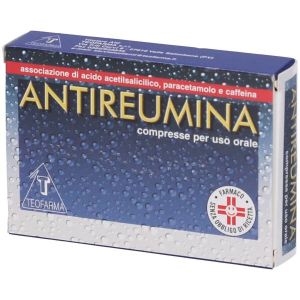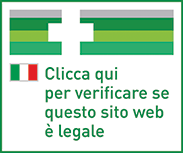Ship in Europe, Find out rates!
Language
Antireumin Tablets Acetylsalicylic Acid / Paracetamol 10 Tablets

Regular Price
€6.31
Special Price
€5.90
-6%
Save: €0.41
In stock
Recent lowest price:
€5.63
- box Delivery in Italy in 24/48 and free returns
- star3.000+ positive reviews
- dropboxOver 60,000 products in the catalog
Manufacturer
TEOFARMA
SKU
004172021
Active principle
PARACETAMOLO/ACIDO ACETILSALICILICO/CAFFEINA
NAME
ANTIREUMIN
PHARMACOTHERAPEUTIC CATEGORY
Other analgesics and antipyretics.
ACTIVE PRINCIPLES
Each tablet contains: 275 mg acetylsalicylic acid; paracetamol 175 mg; caffeine 25 mg.
EXCIPIENTS
Corn starch, microcrystalline cellulose, magnesium stearate, precipitated silica.
INDICATIONS
Symptomatic treatment of headache, neuralgia, toothache, menstrual pain, joint pain, fever and cold syndromes.
CONTRAINDICATIONS / SECONDARY EFFECT
Hypersensitivity 'individual ascertained to the components. Paracetamol-based products are contraindicated in patients with manifest insufficiency of glucose-6-phosphate dehydrogenase and in those with severe haemolytic anemia. Severe hepatocellular insufficiency. Established tendency to haemorrhages. Gastropathies (e.g. gastroduodenal ulcer). Asthma. Third trimester of pregnancy. The use of this medicine is contraindicated in children and young people under the age of sixteen.
DOSAGE
Adults: 1 to 4 tablets per day. Do not exceed the recommended dose; in particular elderly patients should follow the minimum dosages indicated above. The product should be taken on a full stomach.
STORAGE
Store at room temperature.
WARNINGS
Do not administer for more than 3 consecutive days. In addition, the doctor should be consulted by patients with chronic or recurrent gastric or intestinal disorders. During treatment with paracetamol, before taking any other drug, check that it does not contain the same active ingredient, since if paracetamol is taken in high doses, serious adverse reactions may occur. The use of the drug, like any drug that inhibits prostaglandin synthesis and cyclooxygenase, is not recommended in women intending to become pregnant. The administration of the drug should be suspended in women who have fertility problems 'or who are undergoing investigation of fertility'. Instruct the patient to contact the physician before associating any other medication. The use of the product is not recommended if the patient is being treated with other anti-inflammatories. Use with caution in subjects with hepatic or renal insufficiency. In rare cases of allergic reactions, administration should be discontinued. This medicinal product should not be used in children and young people under the age of 16. Individuals older than 70 years of age, especially in the presence of concomitant therapies, should use this medicine only after consulting a doctor.
INTERACTIONS
Use with extreme caution and under strict control during chronic treatment with drugs that can determine the induction of hepatic monooxygenases or in case of exposure to substances that can have this effect (for example rifampicin, cimetidine, antiepileptics such as glutethimide, phenobarbital, carbamazepine). The drug can interact with anticoagulants, uricosurics, sulfonylureas, hypoglycemic agents. The administration of the product, due to the presence of paracetamol, can interfere with the determination of uric acid (by the method of phosphotungstic acid) and with that of glycaemia (by the method of glucose-oxidase-peroxidase). Preoperative use can hinder intraoperative haemostasis.
SIDE EFFECTS
Gastro-enteric disorders, dizziness, allergic rash may occur. Due to the presence of acetylsalicylic acid, otovestibular disorders (humming, etc.), haemorrhagic phenomena (epistaxis, gingivorrhagia, etc.), delay in childbirth and reduction in platelet count may also occur. Skin reactions of various types and severity have been reported with the use of paracetamol, including cases of erythema multiforme, Stevens Johnson syndrome and epidermal necrolysis. Hypersensitivity reactions have also been reported, such as angioedema, edema of the larynx, anaphylactic shock. In addition, the following undesirable effects have been reported: thrombocytopenia, leukopenia, anemia, agranulocytosis, impaired liver function and hepatitis, kidney disorders (acute renal failure, interstitial nephritis, hematuria, anuria), gastrointestinal reactions and dizziness.
PREGNANCY AND BREASTFEEDING
The use of the product is contraindicated in the third trimester of pregnancy. Antireumin contains acetylsalicylic acid (ASA). Clinical studies indicate that doses of ASA up to 100 mg / day can be considered safe for use only in obstetrics, which requires specialist monitoring. >> Doses of ASA 100-500 mg / day. There are insufficient clinical data regarding the use of doses above 100 mg / day up to 500 mg / day. Therefore, the recommendations below for doses of 500 mg / day and above also apply to this dosage range. >> Doses of ASA 500 mg / day and above. Inhibition of prostaglandin synthesis can negatively affect pregnancy and / or embryo / fetal development. Results of epidemiological studies suggest an increased risk of miscarriage and cardiac malformation and gastroschisis after use of a prostaglandin synthesis inhibitor in early pregnancy. The absolute risk of cardiac malformations increased from less than 1% to approximately 1.5%. The risk was believed to increase with dose and duration of therapy. During the first and second trimester of pregnancy, acetylsalicylic acid should not be administered except in strictly necessary cases. If acetylsalicylic acid is used by a woman attempting to conceive, or during the first and second trimester of pregnancy, the dose and duration of treatment should be kept as low as possible. During the third trimester of pregnancy, all prostaglandin synthesis inhibitors can expose the fetus to: cardiopulmonary toxicity (with premature closure of the arterial duct and pulmonary hypertension); renal dysfunction, which may progress to renal failure with oligo-hydroamnios; the mother and the newborn, at the end of pregnancy, to: possible prolongation of the bleeding time, and antiplatelet effect which can occur even at very low doses; inhibition of uterine contractions resulting in delayed or prolonged labor Consequently, acetylsalicylic acid at doses> 100 mg / day is contraindicated during the third trimester of pregnancy.
ANTIREUMIN
PHARMACOTHERAPEUTIC CATEGORY
Other analgesics and antipyretics.
ACTIVE PRINCIPLES
Each tablet contains: 275 mg acetylsalicylic acid; paracetamol 175 mg; caffeine 25 mg.
EXCIPIENTS
Corn starch, microcrystalline cellulose, magnesium stearate, precipitated silica.
INDICATIONS
Symptomatic treatment of headache, neuralgia, toothache, menstrual pain, joint pain, fever and cold syndromes.
CONTRAINDICATIONS / SECONDARY EFFECT
Hypersensitivity 'individual ascertained to the components. Paracetamol-based products are contraindicated in patients with manifest insufficiency of glucose-6-phosphate dehydrogenase and in those with severe haemolytic anemia. Severe hepatocellular insufficiency. Established tendency to haemorrhages. Gastropathies (e.g. gastroduodenal ulcer). Asthma. Third trimester of pregnancy. The use of this medicine is contraindicated in children and young people under the age of sixteen.
DOSAGE
Adults: 1 to 4 tablets per day. Do not exceed the recommended dose; in particular elderly patients should follow the minimum dosages indicated above. The product should be taken on a full stomach.
STORAGE
Store at room temperature.
WARNINGS
Do not administer for more than 3 consecutive days. In addition, the doctor should be consulted by patients with chronic or recurrent gastric or intestinal disorders. During treatment with paracetamol, before taking any other drug, check that it does not contain the same active ingredient, since if paracetamol is taken in high doses, serious adverse reactions may occur. The use of the drug, like any drug that inhibits prostaglandin synthesis and cyclooxygenase, is not recommended in women intending to become pregnant. The administration of the drug should be suspended in women who have fertility problems 'or who are undergoing investigation of fertility'. Instruct the patient to contact the physician before associating any other medication. The use of the product is not recommended if the patient is being treated with other anti-inflammatories. Use with caution in subjects with hepatic or renal insufficiency. In rare cases of allergic reactions, administration should be discontinued. This medicinal product should not be used in children and young people under the age of 16. Individuals older than 70 years of age, especially in the presence of concomitant therapies, should use this medicine only after consulting a doctor.
INTERACTIONS
Use with extreme caution and under strict control during chronic treatment with drugs that can determine the induction of hepatic monooxygenases or in case of exposure to substances that can have this effect (for example rifampicin, cimetidine, antiepileptics such as glutethimide, phenobarbital, carbamazepine). The drug can interact with anticoagulants, uricosurics, sulfonylureas, hypoglycemic agents. The administration of the product, due to the presence of paracetamol, can interfere with the determination of uric acid (by the method of phosphotungstic acid) and with that of glycaemia (by the method of glucose-oxidase-peroxidase). Preoperative use can hinder intraoperative haemostasis.
SIDE EFFECTS
Gastro-enteric disorders, dizziness, allergic rash may occur. Due to the presence of acetylsalicylic acid, otovestibular disorders (humming, etc.), haemorrhagic phenomena (epistaxis, gingivorrhagia, etc.), delay in childbirth and reduction in platelet count may also occur. Skin reactions of various types and severity have been reported with the use of paracetamol, including cases of erythema multiforme, Stevens Johnson syndrome and epidermal necrolysis. Hypersensitivity reactions have also been reported, such as angioedema, edema of the larynx, anaphylactic shock. In addition, the following undesirable effects have been reported: thrombocytopenia, leukopenia, anemia, agranulocytosis, impaired liver function and hepatitis, kidney disorders (acute renal failure, interstitial nephritis, hematuria, anuria), gastrointestinal reactions and dizziness.
PREGNANCY AND BREASTFEEDING
The use of the product is contraindicated in the third trimester of pregnancy. Antireumin contains acetylsalicylic acid (ASA). Clinical studies indicate that doses of ASA up to 100 mg / day can be considered safe for use only in obstetrics, which requires specialist monitoring. >> Doses of ASA 100-500 mg / day. There are insufficient clinical data regarding the use of doses above 100 mg / day up to 500 mg / day. Therefore, the recommendations below for doses of 500 mg / day and above also apply to this dosage range. >> Doses of ASA 500 mg / day and above. Inhibition of prostaglandin synthesis can negatively affect pregnancy and / or embryo / fetal development. Results of epidemiological studies suggest an increased risk of miscarriage and cardiac malformation and gastroschisis after use of a prostaglandin synthesis inhibitor in early pregnancy. The absolute risk of cardiac malformations increased from less than 1% to approximately 1.5%. The risk was believed to increase with dose and duration of therapy. During the first and second trimester of pregnancy, acetylsalicylic acid should not be administered except in strictly necessary cases. If acetylsalicylic acid is used by a woman attempting to conceive, or during the first and second trimester of pregnancy, the dose and duration of treatment should be kept as low as possible. During the third trimester of pregnancy, all prostaglandin synthesis inhibitors can expose the fetus to: cardiopulmonary toxicity (with premature closure of the arterial duct and pulmonary hypertension); renal dysfunction, which may progress to renal failure with oligo-hydroamnios; the mother and the newborn, at the end of pregnancy, to: possible prolongation of the bleeding time, and antiplatelet effect which can occur even at very low doses; inhibition of uterine contractions resulting in delayed or prolonged labor Consequently, acetylsalicylic acid at doses> 100 mg / day is contraindicated during the third trimester of pregnancy.
| Destination | Cost | Detail |
|---|---|---|
| Italy | €5,90* | 24/72H |
| Austria, France, Germany, Slovenia | € 13* | 3 days |
| Belgium, Luxembourg, Portugal, Netherlands, Spain | € 14* | 4 days |
| Bulgary, Cechia, Hungary, Poland, Romania, Slovakia | € 19* | 5 days |
| Denmark, Estonia, Finland, Ireland, Lithuania, Latvia ,Sweden | € 22* | 5 days |
| United Kingdom, Switzerland, Greece, Malta/td> | € 30* | 7 days |
| Canada | € 40 | 7 Days |
European shipments with express courier: FedEx, MBE, DHL
*For the shipment outside band B ther's an extra cost of 22€ *For the shipment outside band C ther's an extra cost of 30€ Delivery Times exclude Saturday and Holidays
For Islands and Areas of difficult Accessibility the shipments are made in 72 hours and the cost will be increased by 15€
The images of the products shown on our site are purely indicative and may differ in shape, color, text and packaging shown on them. Given the difficulty of updating all the products on our site in real time or any errors, XFarma.it, all products will be identified through SKU MINSAN (code of the Ministry of Health).


